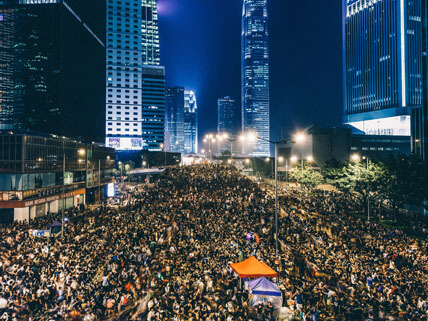A crowd of antigovernment protesters occupy the streets in Hong Kong’s Admiralty district on September 30, 2014.
The future of the city of Hong Kong is under a cloud. The Chinese government in Beijing announced a new national security law for Hong Kong at the end of June that dramatically changes its special status within the People’s Republic of China (PRC). This law limits the autonomy of the local government and greatly restricts freedoms of Hong Kong’s 7.5 million residents. The new law is widely seen as an attempt to thwart growing challenges to Chinese leader Xi Jinping’s authority. The announcement comes on the heels of massive pro-democracy protests that shook the former British colony over the last year.
Hong Kong was colonized by the British Empire from 1841, after British forces occupied the city following the First Opium War. Hong Kong became a major financial center and East–West trade hub, and it remained a British colony for a century and a half. On July 1, 1997, it was handed over to mainland China per the 1984 Sino-British Joint Declaration. China committed to a “one country, two systems” formula, which was affirmed in Hong Kong’s constitution, or Basic Law. By this agreement, China promised not to impose communist rule on Hong Kong and to allow the city a “high degree of autonomy” for the subsequent 50 years (that is, until 2047). Only foreign and defense affairs were to be controlled by the PRC.
As a special administrative region, Hong Kong thus enjoyed a semi-autonomous status within the PRC. Branded as “Asia’s World City,” capitalist Hong Kong gave Communist China access to the global economy—and prospered. At the same time, the PRC avoided systemic changes and disruptions to the mainland economy. In 2014, however, pro-democracy protests known as the Umbrella Revolution flared up in Hong Kong. Demonstrators carrying umbrellas en masse protested for free elections and expansion of voting rights.
More recently, tensions between Hong Kongers and their government increased. Mass antigovernment demonstrations led to often violent unrest. The protests were in large part a reaction to an extradition bill being considered by Hong Kong’s government. The bill would permit certain criminal suspects to be taken to mainland China for trial. At one point in 2019, before the coronavirus outbreak, nearly 2 million people thronged the streets. (The bill was later withdrawn.) Despite the COVID-19 pandemic, the protests have continued. And now the curtain on dissent has descended.
Image credit: © coloursinmylife/Shutterstock
Related Links:
- 2019–2020 Hong Kong Protests Timeline
Timeline of recent events in Hong Kong from a Chinese nongovernmental organization that “provides bridges and uncensored platforms for diverse Chinese voices.”
(Source: Human Rights in China, June 19, 2020) - China’s Crackdown on Hong Kong Is about Intimidation
Analysis of impact of China’s new national security law for Hong Kong.
(Source: The Dispatch, July 3, 2020) - What You Should Know about China’s New National Security Law for Hong Kong
Video explaining consequences of the new National Security Law for Hong Kong.
(Source: South China Morning Post, July 2, 2020) - Why National Security Law Will Not Be the Death of Hong Kong, Just as the Handover Wasn’t
Opinion piece by a China observer assessing, with guarded optimism, the future prospects of Hong Kong under the new national security law.
(Source: South China Morning Post, July 4, 2020) - Hong Kong’s Umbrella Revolution
Read about Hong Kong’s so-called Umbrella Revolution, in 2014, precursor to the city’s recent antigovernment demonstrations.
(Source: The Guardian, September 30, 2014) - Hong Kong Ceded to the British
This article describes how Hong Kong became a British possession in 1841.
(Source: History.com; accessed July 9, 2020) - Hong Kong
Summary of data for Hong Kong from CIA World Factbook.
(Source: The World Factbook; accessed July 9, 2020)




